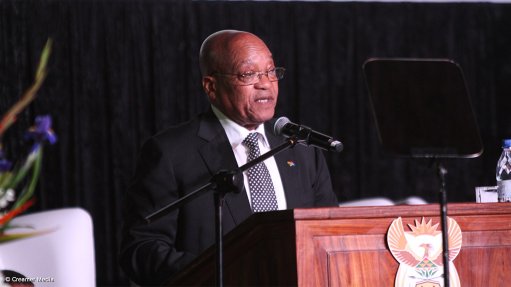
President Jacob Zuma
Photo by: Duane Daws
President Jacob Zuma’s 2017 State of the Nation Address (Sona), delivered against a chaotic background in which opposition parties were ejected or chose to leave the chamber, failed to impress some experts, and questions are being raised about what will be next on the agenda for South Africa’s growth story.
When Zuma was able to present his yearly Sona on Thursday, after more than a hour of interjections by opposition MPs, he highlighted achievements to date and promised renewed focus on radical socioeconomic transformation, besides others.
While the contents of the speech touched on some key aspects of South Africa’s economy, a limited outline of the steps to be undertaken to achieve certain growth plans failed to instil confidence that implementation would be successful and that the economy would be turned around.
The speech itself held important substantive merit, but South Africa remained in a very difficult situation, with the world watching, University of Witwatersrand Business School (WBS) senior lecturer Dr Geoff Heald said on Friday.
Speaking at a WBS-hosted 2017 Sona: Analysis and Insights panel session, he said the President’s address went from “nought to zero” in a country facing a tenuous situation that left it no choice but to “learn in the gutter” and urgently accelerate its economic path.
The country had reached a tipping point 23 years after democracy wherein the basic structures of apartheid stubbornly remain deeply embedded in the struggling economy.
With a failure of formal politics to resolve tension and provide solutions and the country in a state of hyperconflict, political analyst and author Moeletsi Mbeki said it was now up to the black middle class to start stepping up and contributing towards a brighter future.
While the African National Congress is unlikely to achieve much more in its fractured state at present, the ruling party had made great gains over the past two decades and had built a “massive” black middle class base that could be leveraged as a platform for collaboration.
Mbeki urged the black middle class to start stepping up and question how to use the foundation to present solutions and bring the country into a new era.
Independent political analyst Ralph Mathekga suggested that there was a “space of creativity” not currently being explored amid “old ways” of thinking.
Further, while he considered the contents of Zuma’s speech to be “good”, the lack of expansive resources needed to achieve some of the highlighted aims, made it somewhat impractical.
Adding to the discussion, WSG political economy Professor Patrick Bond said, in the face of the failure of liberalised economies, of which the country could be considered one, he agreed with the Congress of the South African Trade Unions’ standpoint that the speech fell short on expectations and held hints of a “talk left, walk right” approach.